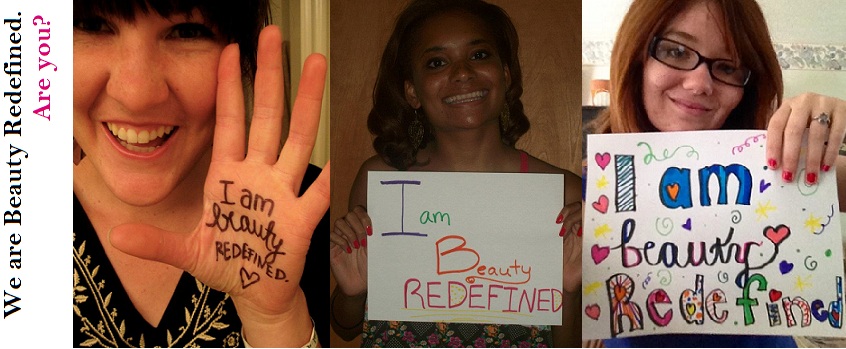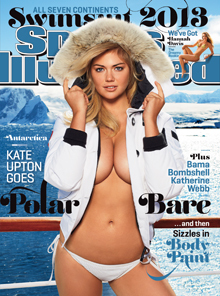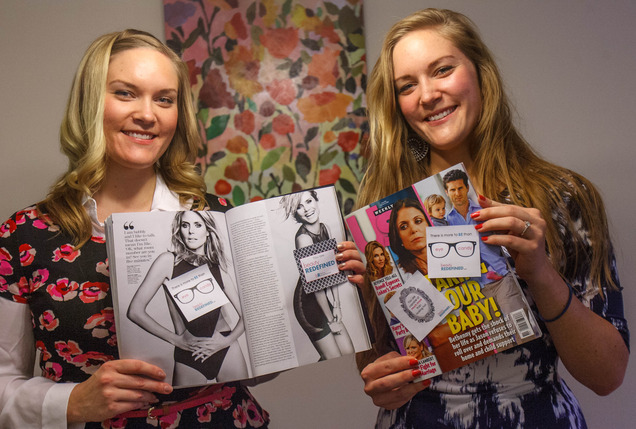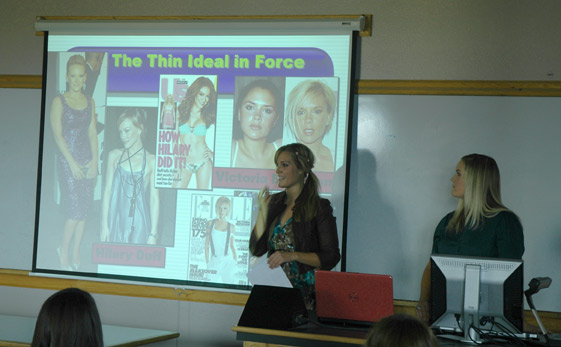Redefining ‘beauty’—USU grads take on sexism in SI swimsuit issue
February 28th, 2013 Posted in OpinionBy Dani Hayes
LOGAN—Lindsay and Lexie Kite have taken aim at one of the top icons of male chauvinism—the annual Sports Illustrated swimsuit issue—as part of their campaign against media sexism.
Protesting SI’s objectification of women (“soft porn,” they call it), the University of Utah PhD students are using sticky-notes with phrases like, “You are capable of much more than looking hot,” to spread their message that media outlets can damage women’s self-worth.
The sisters, who graduated from Utah State in 2006, have researched the female body image for years and are now in the national limelight with their campaign to call down Sports Illustrated for its sexist attitudes toward women.
The campaign, which has gotten supporters thrown out of bookstores, is part of their years-long work with their non-profit foundation Beauty Redefined.
• Listen to Lexie & Lindsay Kite discuss their research on Utah Public Radio
“I did a 40-year analysis of the swimsuit issue because I was so intrigued how it has become what it is today, under the guise of sports journalism,” Lexie said. What she found was a drastic change of a few pages in the middle of the sports magazine of women wearing full swimsuits.
SI has “normalized pornography,” she says, “where women are in a state of undress, more often unclothed than clothed.”
The annual Sports Illustrated swimsuit edition sells millions of copies and generates a significant percentage of the magazine’s annual revenue. In their research, the Kites have found a change in the magazine’s swimsuit edition, which no longer has anything to do with women’s athlete prowess.
“This is a magazine that is largely marketed to men because they rarely take opportunity to feature female athletes within their pages and especially not on their covers,” Lindsay Kite said. “But this is not a men’s magazine. This isn’t Penthouse, Playboy or Hustler. This is Sports Illustrated.
“Back in the ’80s and even throughout the ’90s, they featured women on their covers and within their pages, female athletes, much more often than they do now … They have taken a real turn.”
Beyond the lack of serious coverage of women athletes in SI, the sisters say they are are disgusted by the amount of Photoshop, digital manipulation and cosmetic surgery seen in female imagery in the mass media. (Examples here.)
“We see women being enhanced surgically and digitally creating [unrealistic] ideals,” Lindsay said. “We become totally desensitized to these things.”
The Kite sisters have received a lot of publicity with their sticky-note campaign, including vast amounts of negative comments from critics who say they are just angry, ugly and jealous.
“As you can see in these comments, people are absolutely enraged that we would think there is something objectionable about the swimsuit issue,” Lindsay said. “People are so used to seeing this kind of explicit images in the grocery store checkout stand that they think we are just conservative and prudish and trying to censor these images, when absolutely that is not what we are doing.
“We are all about fighting the objectification of women,” she said. “When women are consistently viewed as objects they learn to view themselves as objects. And that means they treat themselves poorly.”
Media images can be damaging to both women and men as they come to view idealized and Photoshopped “beauty” as normal and expected.
 “We know that most women and girls feel terrible about their bodies,” Lindsay said. “The word ‘disgusted’ comes up more often than not within studies. When women see themselves, especially in comparison to idealized images like these on the swimsuit issue, then they learn to view themselves as sub-par, and then treat their bodies that way.”
“We know that most women and girls feel terrible about their bodies,” Lindsay said. “The word ‘disgusted’ comes up more often than not within studies. When women see themselves, especially in comparison to idealized images like these on the swimsuit issue, then they learn to view themselves as sub-par, and then treat their bodies that way.”
Brenda Cooper, an associate professor of journalism and communication at Utah State University and former director of USU’s Women & Gender Studies Program, agrees. Because images of women are so often sexualized, they limit how society perceives women.
“We have a very limited perception of women,” Cooper said. “We need a broader range of worth for women. When we depict a strong woman, she comes off as a bitch … When powerful women are depicted without sexuality; they are shown as evil.”
Cooper says she would prefer to see female athletes portrayed as male athletes are—sweaty, out of breath, exhausted, without a care of what they look like. She says she is bothered that what media and society focus on for women is their sexuality and not their athleticism. This is especially troubling, she says, in a magazine dedicated to sports.
“Even in sports, women are judged on their looks rather than their athletic ability,” she said. “It’s so ingrained in our culture that this is how we look at women—as sexual objects.
“Female characters [in the mass media] are valued by how they look and not for what they do,” Cooper said. “Little girls learn so early that they have to be cute. It’s such a hard pattern to break … that’s why there is a lot of ingrained negativity.”
The Kite sisters, who credit Cooper’s classes at USU with inspiring their research and work with Beauty Redefined, are trying to expose the “ideal” images of women seen every day as unrealistic and damaging.
“Research shows us that women and girls are greatly affected by these billions and billions of images that this generation has seen like never before,” said Lexie. “[Self-objectification] happens when girls and women live in this objectifying-media culture. They learn to view themselves as ‘parts that need fixing,’ and that’s where their success and happiness will come from.”
With their Beauty Redefined project, a non-profit foundation, the Kites want to help girls and women steer away from the idea of the unreal female images found in the media are standard. “There is more to be than eye candy” is another saying on a sticky-note because the sisters understand that because of the engrained cultural ideals and standards women are held to, a lot of other aspects of life are left uncultivated.
“When you are self-conscious of your body and you’re picturing yourself being looked at, it stops female progress in every way that counts,” Lexie said. “The ability to help women feel empowered and understand their value a little bit more is what we are all about and we are so glad to do it.”
 Their efforts encompass much more than speaking out against Sports Illustrated.
Their efforts encompass much more than speaking out against Sports Illustrated.
“Beauty Redefined is all about helping people to expand this definition of beauty, to be something that is a little bit more inclusive,” Lindsay said. “Right now, [society’s] definition of beauty is extremely tall, extremely thin—it’s white, it has long flowing hair, it’s young.”
The sisters are determined to show how the media manipulates images through surgical and digital enhancements into unrealistic standards.
“We grow up with our ideas of normal just being totally different from what they are when you look eye to eye with people,” Lindsay said. “We are really desensitized to ideal images, therefore, girls and women grow up feeling sub-par, feeling that they are the ones that are abnormal because they just don’t look anything like so many of these images we see in media.”
The Kites talk about expanding the definition of beauty. Their goal is to include the everyday characteristics found in the average women by recognizing and appreciating the beauty of real people, they said.
“We are all about promoting positive body image,” Lindsay said, “Girls and women who feel OK about themselves, regardless about what they look like, if they feel like they are beautiful, they actually take better care of their bodies.”
Dedicating their academic studies to these issues, the sisters will complete their doctoral degrees this spring and plans to move their foundation forward. They are undeterred by critics, who see their sticky-note campaign as violating Sports Illustrated’s First Amendment or private property rights.
Brenda Cooper, who taught the Kite sisters as undergraduates at USU, agrees. She’s proud of their work.
“If we always went by the rules, nothing would change,” she said. “Well-behaved women seldom make history, and that’s what I think about Lindsay and Lexie …
“Nothing changes if you accept the status quo.”
TP
Tags: Brenda Cooper, feminism, gender, Lexie Kite, Lindsay Kite, sexism, Sports Illustrated



Sorry, comments for this entry are closed at this time.